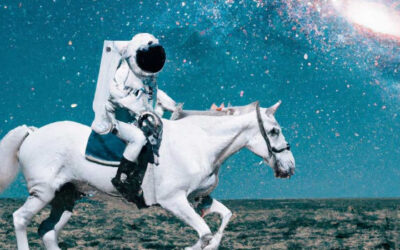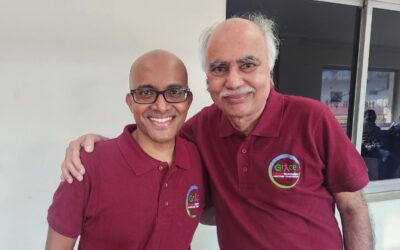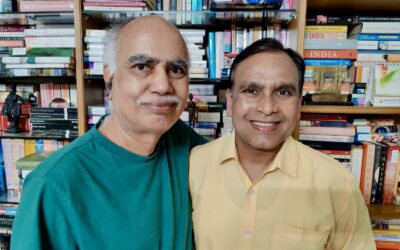I recently met Mr. Chandu Thota, Vice President at Google, when he was here in Hyderabad, where he studied at Osmania Engineering College. Chandu played a pioneering role in the development of digital mapping. He worked at Microsoft from 2002 to 2007 on maps and later established his own company…

Universal Life-guides
Universal Life-guides

I had gone to Greece in 2006 with my wife and had spent a week there. We traversed from Athens to the Temple of Apollo at Delphi in the hills and sailed in the Saronic Gulf to the Hydra, Poros and Aegina islands in a cruise boat. In Athens, one of the world’s oldest cities, with its recorded history spanning over 3,400 years, I roamed around as if in a trance, while my wife attended her conference. There were ruins with their stories everywhere – the Acropolis with the temples of Parthenon and Athena Nike, the Agora marketplace, and the Panathenaic Stadium, with a capacity for 60,000 spectators, constructed around the year 335 before common era.
I also visited the cave at the Philoppapos hill, where Socrates was tried and sentenced to drink poison for his refusal to give up his philosophical views. It looks so strange in today’s modern world of deal makings. Even a cursory study of world history reveals that in different times, people living in totally disconnected lands had got a consciousness upgrade. The first such, or rather well established, instance is the “Axial Age” some 2500 years ago. Socrates in Greece, Buddha in India, and Confucius in China were talking from a higher level of consciousness. Having accomplished his mission, Socrates left this world satisfied, what if by drinking poison.
The term for religion used in the Indian civilization is “Sanatana Dharma” – an eternal order of righteousness. It is a constant ascent of consciousness since time immemorial conveyed through individual thinkers for articulation and communicated to the people around them. Lokmanya Balgangadhar Tilak (1856-1920) traced the origin of mankind to the Arctic Circle from where early humans traversed to the Northern parts of Europe and Asia in search of lands for new settlements around 10,000 years ago, possibly due to an ice deluge. This hypothesis is contrary to the Western narrative but is indeed quite credible.
The sky at the North Pole would have been seen by the early men as a heaven revolving around as a potter’s wheel. The stars would not rise and set but move round and round in horizontal planes during the long night of six months. The empty horizons, the whooping winds, the fire emerging out of stones… this stunning drama was recorded in several Vedic and Zoroastrian hymns, which looks weird to the people living away from the poles in the modern world, but that is how it was. Our ancestors knew that human beings are not only very small, but also very ephemeral.
The order in ever-changing phenomenon was observed and recorded. It was called “Rta” by the Vedic people and seasons were therefore known as “Rtu” in most of the Indian languages. People lived together through consensus and cooperation. The ancient Indian, Greco-Roman and African societies were governed by the elites with widespread participation of the people. Then the game of thrones started. Empires started capturing territories, dividing people into winners and losers – the Mauryan, the Persian, and the Roman empires became the new world order. However, universal ideas keep flourishing beneath ever-changing political formations.
In this period of empire-making, a businessman, Zeno from Citium, Cyprus, had a shipwreck, losing all his wealth and landed in Athens as a pauper. There, he got introduced to the ideas of Socrates, who had lived there a 100 years earlier. Zeno believed in the divine nature of the universe and the end goal of human life to achieve one’s highest version by living according to Nature. He started a school that attracted many young people. He used to address his students from a painted porch, “Stoa Poikile” in Greek. His teachings acquired the name Stoicism, or the philosophy of “The Porch.” One must live in the world like a person smiling on the “porch” after coming out of his house after a big fight with his spouse.
This disposition resonates with the term “Stithpragya,” introduced in verse 52 of the second chapter in the Shrimad Bhagavad Gita. It indeed refers to the mental disposition of one who is situated in divine consciousness. In the next 18 verses, such a person is elaborately described. For us ordinary people of the world, “Pragya” is wise, intelligent, and learned; whereas “Sthit” means grounded, anchored, stayed, steady, and firm. When combining both words “Stithpragya” means — a person who has disciplined the mind and senses, is firm in judgment, and free from any delusions. In other words, it refers to one who is contended, determined, and steady in life.
In Stoic literature, we come across concepts like “Eudaimonia,” which means human flourishing, prosperity, and blessedness, perfectly matching a Stithpragya. And Stoics tell you to take responsibility, live expressing your highest self (“Arete” in Greek), and focus on what you can control, leaving the result to the higher power, as if explaining verse 47 of Chapter II in the Shrimad Bhagavad Gita in a different language to a different audience.
कर्मण्येवाधिकारस्ते मा फलेषु कदाचन।
मा कर्मफलहेतुर्भूर्मा ते सङ्गोऽस्त्वकर्मणि।।
Your right is for action alone, never for the results. Do not become the agent of the results of action. May you not have any inclination for inaction.
An IT professional, Jaisooria, is my son, Amol’s friend. He lost his father, Dr. Kalpetta Balakrishnan, renowned writer and ex-secretary of Kerala Kalamandalam, and a humanist philosopher, in December 2020. Balakrishnanji taught at Sree Kerala Varma College at Thrissur and was a senate member in Cochin and Calicut Universities. When Amol told Jaisooria about my observation of a great parallel between Stoicism and the idea of Stithpragya postulated in the Shrimad Bhagavad Gita, Jaisooria told him that during his last days, his father was contemplating to write on this topic. Taking it as God’s will, I will take up this task now.
Religion and mythology have long been used as vehicles for philosophical teachings but in the Internet driven world, these vehicles seem to have gone out of fashion, if not turned obsolete. Universal philosophical themes – action without attachment, the perils of escapism, oneness with the universe, and the pitfalls of desires – do not need rituals, gurus and cults. They need to be practiced in everyday action. The power of philosophy to blunt the blows of fate is a credible tool at everyone’s disposal.
I leave you with three cues from Marcus Aurelius: (1) If it is not right, do not do it; if it is not true, do not say it; (2) Dig within. Within is the wellspring of Good; and it is always ready to bubble up, if you just dig; and (3) Most of what we say and do is not essential. If you can eliminate it, you shall have more time, and more tranquillity. Ask yourself at every moment, “Is this necessary?” If you practice these simple suggestions, you will feel much better, and even more effective in whatever you are doing.
MORE FROM THE BLOG
Spiritual Turnpikes
Can the Change be Stopped?
Meeting people gives meaning to life. I consider myself profusely blessed to have met some of the finest people and learned from them. Chandu Thota, Vice President and Head of Engineering at Google Headquarters in Silicon Valley , is one such person whom I met rather late, but except for a wish that we could have met earlier and worked together…
Paradox of Life
I met Dr Dilip Pawar by chance. But what a good chance it turned out to be. He is an oncologist turned clinical pharmacologist and a leading figure in the discovery of cancer drugs. A sagacious person of calm temperament, Dr Pawar worked with cancer patients throughout his career, especially the poor…












